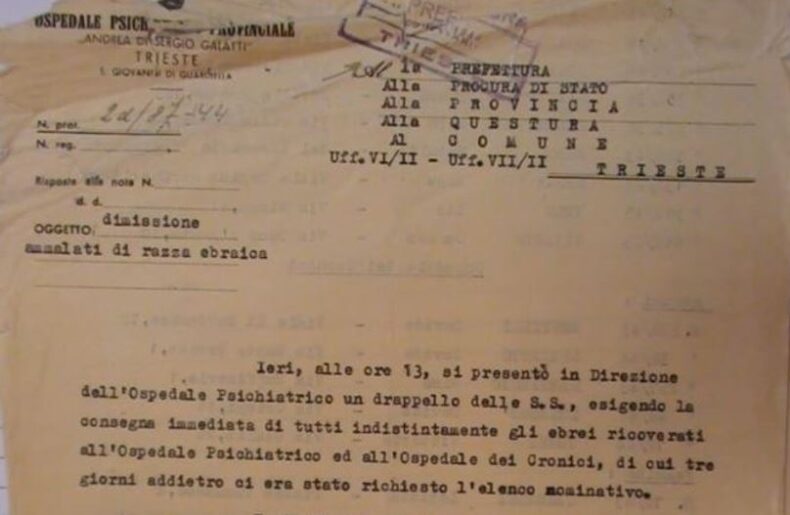Betrayed oath, the deportation of Jewish patients from Trieste hospitals during the Nazi occupation

By Daniela Gross*
In the darkest months of the Nazi Occupation, when the raids were increasing in number and violence was covering Trieste with blood, San Giovanni compound seemed to be a safe place from the storms of history. It was a hospital area, a place of care and hospitality, a whole another universe with a life of its own, secluded from the city. It was easy to be deceived into thinking to be safe from the enemy’s eye, when living behind the walls of the wonderful park along the slopes of that hill.
All hope fell apart on the afternoon of 28th March 1944, when a SS unit burst into the pavilions, gathered the hospitalized Jews and took them away amid excruciating scenes. The patients of the Psychiatric Hospital and the elderly of the Hospital of the Incurables were loaded onto a bus and brought to the concentration camp Risiera San Sabba. From there, they set off for Auschwitz the next day, where they were gassed.
That was one of the most dramatic moments of the Nazi Occupation, commemorated recently at the ‘Carlo e Vera Wagner’ Museum of the Jewish Community of Trieste. The meeting was attended by psychotherapist Helen Brunner, who talked about her experience as a descendant of one of the deportees; the doctor Federica Scrimin; and Tullia Catalan, historian from the Department of Humanities and scientific coordinator of the museum. Besides them, there were also the psychiatrists Michael Von Cranach, who since the ‘80s has been denouncing in Germany the horrors of the T4 Nazi program, which is responsible for sending nearly one hundred thousand mentally ill people to die because considered ‘undeserving of living’; and Lorenzo Toresini, among the firsts to analyse the deportees’ medical records from the psychiatric hospital of Trieste.
The event, entitled “La cura tradita (The oath betrayed)- The deportation of Jewish patients from the hospitals of Trieste during the Nazi occupation’, marks the launch of a fundraising for a grant for research to be carried out at local and national archives in order to realize a commemorative plaque to be displayed at the entrance of the San Giovanni compound next year. If possible, the project will be extended to other medical institutions of the city, where the ethical care and any form of human compassion were violated in the most atrocious way.
Indeed, the deportation of the Jews from San Giovanni compound is not an isolated episode. On the same days, the Nazi raids also targeted the Ospedale Maggiore (the main hospital), the hospital Maddalena and the children’s hospital Burlo Garofalo, while the elderly of the Jewish hospice Gentilomo had been deported two months earlier. Thus, over a hundred hospitalized in these facilities, aged a few days to ninety years old, were deported to the extermination camps. None of them survived.
In this case, the strain of living in a psychiatric hospital merges with racial persecution in a culmination of brutality. The clinical records of the deportees, now yellowed by time, contain stories of psychic suffering that go back in time, forced hospitalizations, the anguish of those who felt trapped, and the desperate attempt of those who did not need treatment but sought escape from the Nazi-Fascist persecution by being hospitalised, helped by some doctors.
Yet, the psychiatric hospital proved to be the place where the utmost violence can be inflicted on the mentally ill, segregated and at the mercy of all. The SS arrived fail-safe. In compliance with the law, every clinical record displayed the “Israelite religion” of the hospitalized patient on the frontispiece. The head physician protested formally and so did the bishop, but they were the only weak reactions, and the story somehow ended up fading among the horrors that marked that period.
The families, however, did not forget, and the bureaucracy recorded – in its own peculiar way – what happened. “Discharged: on 28th March 1944” reads the medical record for each deportee. “Procedure: Taken away manu militari by the SS formations. Departs for unknown destination”. And, in a sort of macabre irony, the anonymous drafter filled in a last box regarding the “outcome of hospitalization”, which turns out to be “unchanged” for each deportee.
To contribute to the grant for research, donations can be made online on Gofundme or through wire transfer to the IBAN of the Museum of the Jewish Community of Trieste IT43I0306902233100000008244 with the description “Donation for the initiative LA CURA TRADITA 1944-2024”.
Above, the letter in which the psychiatric hospital head physician protested the deportation of Jewish patients, which the document’s subject refers to as their “discharge”.
*This article was originally published on Il Piccolo, March 28, 2023.
Translation by Alice Pugliese, student at the Secondary School of Modern Languages for Interpreters and Translators of the University of Trieste, intern at the newspaper office of the Union of the Italian Jewish Communities – Pagine Ebraiche, revised by Gianluca Pace.
